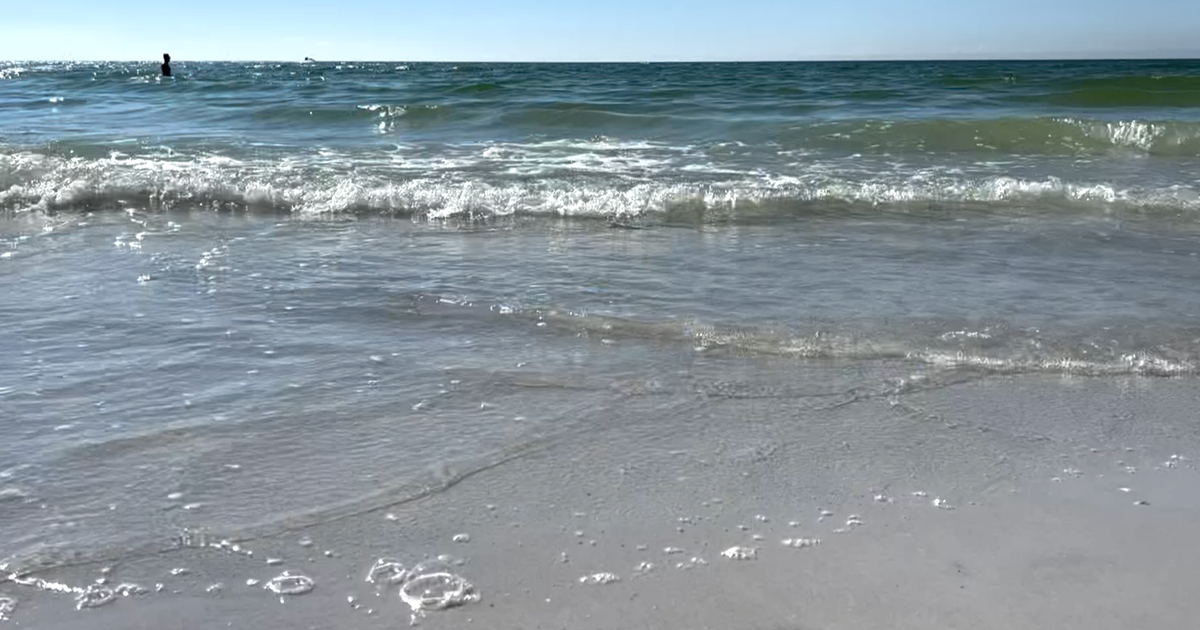State To Reopen Fatal Case Of Inmate Gassing
Follow CBSMIAMI.COM: Facebook | Twitter
TALLAHASSEE (CBSMiami/NSF) - Rommell Johnson, an inmate at a Florida Panhandle prison who had chronic asthma, couldn't breathe on June 3, 2010.
Less than five hours after receiving treatment for severe breathing problems by a day-shift nurse, Johnson was dead, the result of an asthma attack caused by noxious chemicals sprayed by guards. The death was ruled accidental by the Department of Corrections inspector general and a medical examiner.
The circumstances leading up to Johnson's death, and prison officials' handling of it, bear striking similarities to the death just three months later of Randall Jordan-Aparo, an inmate at another Panhandle prison who died after being repeatedly sprayed with the same lethal chemicals used on Johnson.
Both men suffered from chronic breathing ailments. Both men were in solitary confinement when they were accused in official reports of creating disturbances before they were gassed. The same lead inspector --- who found no basis for complaints made by an employee of the Northwest Florida Reception Center in Johnson's death --- oversaw both investigations.
But unlike the Jordan-Aparo case, which last year helped open a floodgate of inquiry into inmate abuse at the hands of prison guards and is now the subject of state and federal investigations, Florida authorities closed the book on Johnson's death after deciding that no one did anything wrong the night the 44-year-old inmate died.
The state paid Johnson's mother $175,000 to settle a wrongful-death lawsuit against the department and a prison nurse who examined Johnson the night he died. No prison workers, including the nurse, were accused by the department of wrongdoing.
After being contacted by The News Service of Florida and told about Johnson's death, Department of Corrections Secretary Julie Jones said she intends to have Johnson's case reviewed by the Florida Department of Law Enforcement, now probing about 100 unresolved prison deaths.
"Although it's old, there's absolutely nothing lost by trying to go back and make sure that justice is done. It doesn't matter if it's past or present. I will open this again and have FDLE review it," Jones, who was named to the secretary's job in December, said Monday.
Inspectors stumbled onto an alleged cover-up involving the death of Jordan-Aparo two years ago while investigating reports of corruption at Franklin Correctional Institution, about 100 miles from the Northwest Florida Reception Center in Washington County, where Johnson was serving a life sentence.
The inspectors later sued the department, claiming they were retaliated against for raising questions about the investigation into Jordan-Aparo's death. A Tallahassee judge dismissed the lawsuit last month, but the inspectors' lawyer said he intends to appeal. Three of the guards involved in Jordan-Aparo's death were fired, and the case is still the subject of state and federal investigations.
It's unclear exactly what took place the night of Johnson's death or even exactly when the inmate --- a paranoid schizophrenic --- died at the Northwest Florida Reception Center. Incident reports, a highly redacted inspector-general's report and an autopsy report by the medical examiner offer different, at times contradictory, accounts.
Florida Justice Institute Executive Director Randall Berg, who represented Johnson's mother in the lawsuit against the state, said it is unknown how many other closed cases bear further scrutiny.
"I don't think that we can ever be confident that we found all of them. I think it's the tip of the iceberg. We can only investigate those cases which are brought to our attention since there is no real meaningful oversight by the department to police itself," Berg said.
According to a sergeant who was on duty at the prison on the night Johnson died, the inmate might have been dead before he was wheeled into the shower to be cleaned off, prior to anyone trying to revive him and before an ambulance was called.
Johnson's cell --- covered in residue from the toxic chemicals which ultimately killed him --- was mopped and cleaned just minutes after the unresponsive inmate was removed from the cell and long before an inspector arrived on the scene. That inspector later dismissed the cleaning of the cell as "routine practice" following use of force incidents.
What is known is that Johnson was gassed at least twice with oleoresin capsicum, or pepper spray. The highly caustic chemical causes tearing, nasal discharge, disorientation and the sensation of respiratory distress and can be lethal for people with asthma.
Ronnie Bowers, a retired sergeant who was working at the prison that night, told The News Service of Florida that Johnson had been targeted for gassing earlier in the day but that a nurse refused to authorize the use of chemical agents on the inmate because of his breathing problems.
Bowers, who retired in 2012, also said that he overheard a conversation between captains during a shift change that led him to believe an inmate was going to be gassed. When questioned by inspectors, one of the captains, Michael Mercer, denied that he had pre-arranged Johnson's gassing.
The Panhandle prison is one of more than a dozen institutions that house some of the state's most dangerous criminals. The Washington County facility on the outskirts of Chipley is among many Florida prisons that provide good jobs in rural areas and have earned the loyalty of generations of workers, many of whose family members also work for the corrections department.
The prison also has faced recent allegations of inmate abuse.
Last month, five Northwest Florida Reception Center guards were indicted by a federal grand jury for allegedly stomping on a shackled and handcuffed inmate on Aug. 5, 2014. The five guards, who were arrested and fired last year in the beating, were also charged with falsifying reports related to the incident. A sixth prison worker, Capt. James Kirkland, was also arrested and fired last year for allegedly ordering the attack. According to Washington County authorities, Kirkland died of a self-inflicted gunshot wound in December.
In the 2010 gassing case, Johnson, who was under "close" supervision in solitary confinement, created a disturbance in the G-dormitory by yelling and refusing to return his food tray about 4 p.m., according to the investigative report written by Senior Inspector Art Rountree. Several officers "counseled" Johnson and warned him that he would be gassed if he did not return the tray and quiet down.
Mercer reviewed Johnson's chart "and found no medical condition that would be exasperated by the use of chemical spray," investigator Michael Bates wrote in a medical examiner's case summary. As required, Mercer then asked a nurse to confirm that no changes had been made in Johnson's medical records that would prohibit the use of the chemicals and was told by nurse Chavet Paridon that no changes had occurred, although the inmate had been treated for difficulty in breathing that afternoon.
Mercer obtained a canister of the spray and received approval from the duty officer to administer the gas but abandoned the efforts after Johnson complied, according to numerous official reports.
The reports also show that the interaction with Johnson, about 5:10 p.m., was videotaped by a hand-held camera, a procedure required to be used prior to inmates being gassed. Not captured on the hand-held camera were the actual circumstances when Johnson was gassed.
Numerous inmates who were adjacent to Johnson's cell swore that Johnson was gassed three times the night he died, although official reports only document two gassings. Two anonymous letters sent to then-Gov. Charlie Crist, including one from an officer who was on duty that night, also said that Johnson was gassed three times.
Around 5:30, Mercer reported that Johnson again caused a disturbance, yelling and refusing to stop after he was again warned that he would be gassed.
Sgt. George Cone, whom Mercer had ordered to the dorm from another part of the prison, sprayed Johnson --- clad only in boxer shorts --- twice within five minutes about 6 p.m., emptying 340 grams of the chemicals onto Johnson's face and torso, according to numerous incident reports.
According to the official reports, Johnson was then offered a "cool shower" --- recommended to clean off the chemicals --- but refused. Mercer ordered Johnson to come to the cell door to be handcuffed and shackled so he could be escorted to the shower for decontamination but Johnson did not respond. Mercer ordered another officer to watch Johnson for two hours and continue to offer the cool shower to him every 30 minutes.
By 6:30, "guards indicate they found the victim to have slid down on the floor, face up from a sitting position, breathing but unresponsive to verbal commands," according to the medical examiner's report.
At 7 p.m., several guards "escorted" Johnson from the cell, according to Rountree's report, and took him to the shower. Mercer ordered the guards to put restraints on Johnson. In his incident report, Sgt. Jason Whiddon said that he and two other guards did so.
But Bowers said he saw guards transport the slumped-over inmate, tied to a wheelchair with a bed sheet but with no restraints, to the infirmary. Bowers also said that caught his attention because inmates are always handcuffed or shackled in case they are pretending to be unconscious.
"They put him on the floor of the shower underneath the shower head with his back against the wall. The officers used cups to rinse him from the shoulders down," Sgt. Mark Angove said in an incident report written that night.
Once in the shower, Johnson "refused to acknowledge staff or orders or follow them," according to Mercer's incident report.
After the shower, Johnson was taken back to the medical unit where nurse Viven Ogg performed various tests, including placing ammonia under Johnson's nose, to make sure that he wasn't faking respiratory distress. Someone later tried to resuscitate Johnson.
At approximately 7:10 p.m., "when he became unresponsive and quit breathing," prison staff tried to resuscitate Johnson, according to Bates' report. He was pronounced dead on arrival after being transported by ambulance to a nearby hospital.
Videos from cameras in the prison showed that orderlies entered Johnson's cell 15 minutes after he was removed from it and began to clean it up.
"This was routine practice following all uses of force," Rountree wrote in his report.
Two days later, Bowers said that two guards who were working for him and who had participated in the use of force on Johnson were called to the front office.
When they returned, Bowers said the guards told him they had to sign the reports detailing what happened the night Johnson died.
Prison officials "had the paperwork looking good" and told the two guards that "all they had to do was stick together," Bowers said the men told him.
"It was a cover-up job," Bowers said.
Inmates who were in the confinement unit the night Johnson died, who were interviewed between a week and two months after the incident, said they never heard Johnson creating a ruckus before he was gassed.
Two inmates --- Levert Stewart and Jerome Butler --- who were in a cell across from Johnson said that guards had left the flap on their cell door window open and they were able to see and hear guards coming and going before and after Johnson was gassed.
"During the days following, officers repeatedly came to their cell asking them what they saw and threatened them not to talk to anyone," the inmates told Rountree.
Corrections officials, who have not changed their policy that allows inmates with chronic lung ailments to be gassed, last year asked the Florida Department of Law Enforcement to review unresolved inmate deaths. Johnson's death, considered an accident, was not one of those cases.
Berg, the lawyer for Johnson's family, and other advocates have asked the U.S. Department of Justice, which is reportedly investigating wrongdoing at several state prisons, to do a full review of the Florida prison system.
"As a result of there being no meaningful oversight by the department, one will have no idea whether all of the wrongful deaths have been brought to light," Berg said.
"The News Service of Florida's Dara Kam contributed to this report."



